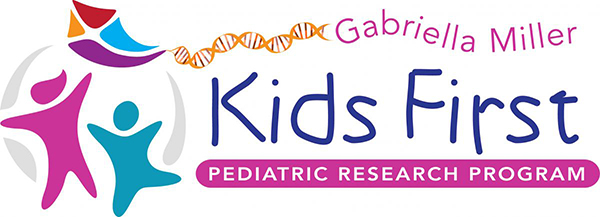Overview
 The Gabriella Miller Kids First Pediatric Research Program (Kids First) is an NIH-wide program supported through the NIH Common Fund that was initiated in response to the 2014 Gabriella Miller Kids First Research Act. Kids First fosters collaborative research to uncover the causes of childhood cancers and structural congenital anomalies and support data sharing within the pediatric research community.
The Gabriella Miller Kids First Pediatric Research Program (Kids First) is an NIH-wide program supported through the NIH Common Fund that was initiated in response to the 2014 Gabriella Miller Kids First Research Act. Kids First fosters collaborative research to uncover the causes of childhood cancers and structural congenital anomalies and support data sharing within the pediatric research community.
In 2018, the program launched the Kids First Data Resource Portal 

Kids First also collaborates with other NIH programs, institutes, and centers, such as the INvestigation of Co-occurring conditions across Lifespan to Understand Down syndromE project and the National Institute on Alcohol Abuse and Alcoholism, to increase sequencing of Down syndrome and fetal alcohol spectrum disorders cohorts. The program is also working with the Common Fund’s Knockout Mouse Phenotyping Project to validate Kids First findings using mouse models.
Topic Areas
To date, Kids First has selected 63 patient cohorts for whole genome sequencing, which represents approximately 55,000 genomes and 21,000 patients. The datasets collected in the Kids First Data Resource Portal represent more than 30 conditions under active study by investigators, with more likely to be included as the program continues.
Conditions range from types of cancer, such as childhood acute myeloid leukemia and Ewing sarcoma, and cancer susceptibility to congenital structural conditions, such as diaphragmatic hernia and orofacial clefts. The work also addresses less common conditions, such as Cornelia de Lange syndrome and pediatric intracranial germ cell tumors, as well as conditions that co-occur with congenital anomalies, such as Down syndrome. Visit the Data Research Portal 
More Information
- NIH Common Fund: Kids First Website
- Gabriella Miller Kids First Data Resource Center
- NICHD Spotlight: Accelerating Research on Childhood Cancer and Birth Defects (April 15, 2019)
- NICHD Contact: Marcia Fournier
 BACK TO TOP
BACK TO TOP